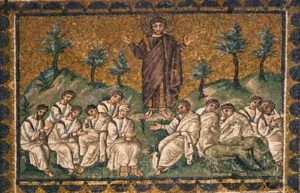Thoughts on Today’s Lessons for Feb. 12, 2017
First Reading: Deuteronomy 30:15-20Our recent readings have followed a common theme. We hear Jesus teaching in the Sermon on the Mount, and we hear the roots of his wisdom in Old Testament readings that emphasize God’s firm commandment to be righteous, to care for the poor and the oppressed; the widow, the orphan and the stranger in our land. We hear it today from Moses, instructing the people at the end of their long journey, preparing to cross over the Jordan into the Promised Land. This is the core of Old Testament teaching: Follow God’s commandments, and inherit the land. Defy God’s wishes, and lose the land and die.
Alternate First Reading: Sirach 15:15-20
Our recent Epiphany readings have followed a common theme. We hear Jesus teaching in the Sermon on the Mount, and we hear the roots of his wisdom in Old Testament readings that emphasize God’s firm commandment to be righteous, to care for the poor and the oppressed; the widow, the orphan and the stranger in our land. Sirach, one of the books known as Apocrypha that come at the end of the Old Testament, sums up God’s teaching (“Torah”) in brisk, memorable advice: We are given free will. God does not force us to keep the commandments – we may choose either fire or water – but God, all-knowing and wise, does not wish us to sin.
Psalm 119, the longest of all the Psalms, devotes all its 176 verses to a consistent message: God’s decrees, God’s law and teaching given in the Torah, are wonderful, and following them makes us happy. The ideas that we hear today in the first eight verses of the Psalm continue throughout, and they echo the covenant between God and Moses at Mount Sinai: Those who follow God’s teaching and walk in God’s ways will be rewarded. The Psalmist calls on God to keep him steadfast in following this teaching, and begs in turn not to be forsaken.
Second Reading: 1 Corinthians 3:1-9
Paul continues making his case to the bickering factions that have formed in his little church at Corinth. Last week we heard him praise the flock for having the spiritual maturity to understand God’s ways. But now he makes it clear, gently but firmly, that they aren’t there yet. He has fed them spiritually with milk, not solid food, because as long as they remain jealous and quarrelsome, they are not yet ready to eat like grown-ups. We are all God’s servants, he emphasizes. Only when we work together in common purpose can God use us to build and grow.
Gospel: Matthew 5:21-37
In the Sermon on the Mount, three full chapters of Matthew’s Gospel, we learn much about discipleship, the hard work of following Jesus toward the Kingdom of God. Jesus, having assured the crowd that he did not come to change the Law and the Prophets, begins interpreting the Law in new and challenging ways. Do you think you understand the commandment, “Do not kill”? Jesus tells us to go further, and do no harm; we must even respond to our enemies in peace. We are not merely bound not to commit adultery, but to treat women with respect! We must do more than simply avoiding false witness: We are called to be honest, be true, say exactly what we mean!

